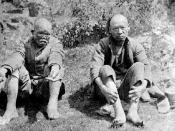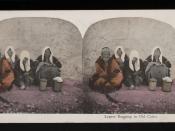Might also be helpful for religious studies even though its a history paper
Secular medicine and its attitudes towards leprosy in medieval Christian and Islamic communities were
influenced by social and religious traditions. Lack of real medical knowledge allowed these influences to affect the
understanding and treatment of disease, as well as the status of the leper in society. Medieval views of leprosy in
Christian and Islamic societies illustrated these ideas. Despite their different cultures and religions, there were some
similar and analogous trains of thought in the understanding of this disease, but different attitudes prevailed as well.
Treatment and understanding of leprosy in European society reflected many Christian ideas. Fear of contagion
and the unpleasant sight of the disease's symptoms led to the practice of separating the leper from the rest of society
(Palmer, p.80). This practice also reflected the biblical idea of the leper found in Leviticus, which calls for the 'unclean'
leper to be cut off completely from society.
In some areas priests performed Levitical rituals of separating the leper from
society (Palmer, p.81). Lepers had their own special hospitals and churches outside of town and city walls, and had to
dress in special garb identifying their affliction. Leper hospitals were under civic control, but religious influence
manifested itself in these institutions. At a hospital in Verona, Italy, statutes required incoming patients confess to the
hospital chaplain to gain admission (Palmer, p.85). Lepers could lose legal rights in some areas; being considered already
dead, their wives could remarry and they could lose control of their will (Palmer, p.81).
Ideas as to the cause and treatment differed, but there were two main conflicting themes regarding the cause
found in medieval Christian society. One idea of the cause of leprosy was sin. Sin in this case especially meant lechery.


